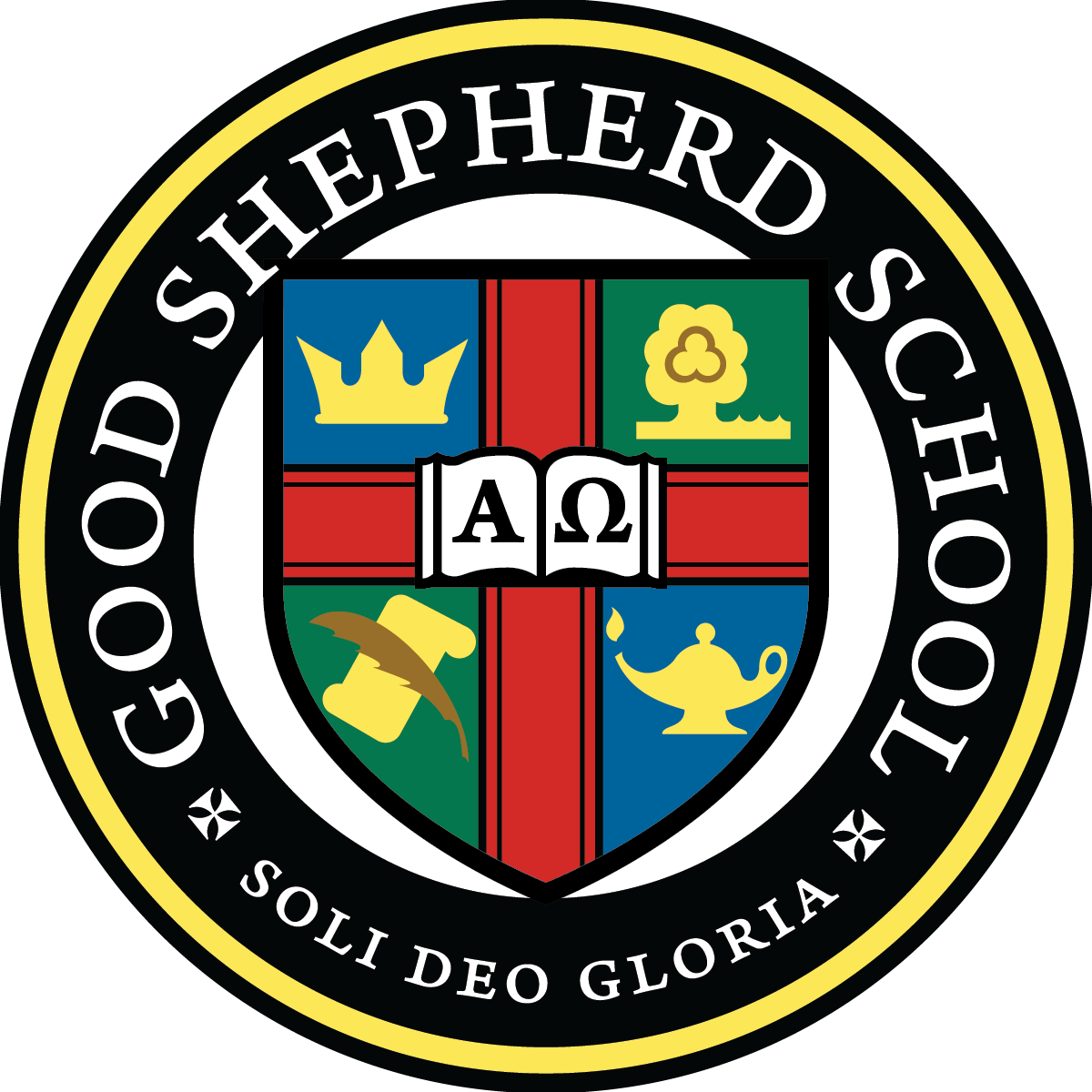“...where the instruction which enlightens the understanding is not separated from the moral education which amends the heart.”

Mortimer Adler, in The Paideia Proposal, divides student learning into three categories. Using his division, we will track through Good Shepherd School’s secondary curriculum three ways.
Students acquire (1) organized information and facts in eight different disciplines: Bible, English language and literature, math, history, science, foreign language, fine arts, and physical education. Students through guided practice and coaching develop the (2) skills of learning: language skills (reading, writing, speaking, listening), quantitative skills (calculating, problem-solving, observing, measuring, estimating), and evaluation skills (distinguishing, relating, comparing, appraising, judging). By entering the “great conversation” through discussion and debate, and by participating in music, drama, and other modes of artistic expression, students gain an (3) enlarged understanding of truth, beauty, and goodness (wisdom).
1. Curriculum as information and facts, organized by discipline (subject)
Imparting information or facts is the standard modern view of education. Classes are organized by subject matter and grouped by discipline. A specific breakdown of Good Shepherd curriculum by subject is listed below.
Subjects
Bible
- Old Testament Survey
- New Testament Survey
- Historic Christian Doctrine
- Biblical Ethics
- World Religions and Defense of the Faith
- World Views
Mathematics
- Pre-Algebra
- Algebra 1
- Geometry
- Algebra 2
- *Pre-Calculus
- *Calculus
Science
- Life Science
- Earth Science
- Physical Science
- Biology
- Chemistry
- *Physics
English Grammar/Literature
- 7th Grade Grammar; Elements of Poetry, Fiction, and Drama
- 8th Grade Grammar; Elements of Poetry, Fiction, and Drama
- 9th Grade Grammar; Classical World Literature
- Medieval World Literature
- Classical Rhetoric; Post-Reformation World Literature
- English Literature
History
- American History (post-Civil War)
- Church History (Apostolic era through Protestant Reformation)
- Greek and Roman World
- Medieval World
- Modern World (post-Reformation) and Economics
- American History and Government (pre-Civil War)
Foreign Language
- Latin 1
- Latin 2
- *Latin 3 (Caesar, Cicero, Pliny, Ovid, Vergil, Vulgate, Latin Mass)
- *AP Latin 4 (Vergil’s Aeneid)
- *Biblical Greek may be taught as an additional requested elective
- Modern Foreign Language studies may be pursued as additional requested elective
Fine & Rhetorical Arts
- Participation in one major play each year, usually Shakespearean
- Sight singing; choir; string orchestra
- Participation in NFL (National Forensic League) competitive Cross Examination Debate each year
- Drawing and Art History
Physical Education
- Stretching, strength, and aerobic exercises for life-long fitness
- Fundamentals and competitive athletics in basketball, soccer
* Honor students only

2. Curriculum as the skills of learning, developed incrementally
The skills outlined below cut across all the disciplines, and so all our teachers share in coaching them. Students practice speaking or writing every day in every class under teacher or peer scrutiny. Coaching at this intense level requires that we keep our classes small.
Language Skills (reading, writing, speaking, listening)
By the end of eighth grade, students are studying classic or master works rather than textbooks. This requires a different level of reading, for which grade seven and eight prepare them. (See book list in section three.)
Also in junior high, students learn to write sentences employing the three types of subordinate clauses (adverb, adjective, noun) and the five types of phrases (prepositional, participial, infinitive, gerund). They gain skill as informative, descriptive, persuasive, and poetic writers through daily practice producing short compositions (1–2 pages).
High school students learn to employ the five canons of classical rhetoric (invention, arrangement, style, memorization, delivery) in longer verbal or written presentations. This includes writing original cases (5–10 pages) for cross-examination debate.
Formal Latin study (required two years, but available to honor students for four) develops critical language skills: an expanded vocabulary, precision and clarity in word use, a seasoned proficiency in grammatical analysis, and an increased appreciation for poetry and nuance.
Quantitative Skills (calculating, problem solving, observing, measuring)
For the most part, Good Shepherd School uses the Saxon Math Program for its secondary mathematics curriculum. The strength of this program is in its recursive method—every problem set and every test is cumulative—which over time automates algebraic and problem solving techniques. Students learn to become comfortable with abstraction and with the use of symbols to reduce mathematical, scientific, or logic problems to their essentials.
In geometry class, students learn to see mathematics as an axiomatic system, built deductively and rigorously from a few basic assumptions. They learn the nature and limits of deductive proof. In science, on the other hand, they learn the power and range of inductive proof—the scientific method—which they must repeatedly employ in demonstration and experiment for the three fundamental sciences: biology, chemistry, and physics.
Evaluation Skills (distinguishing, relating, comparing, appraising, judging)
Because evaluation skills are constantly employed in all subjects in different ways, a progressive development of them in the secondary curriculum cannot be briefly traced. There are crucial points in the curriculum, however, at which students are given and coached in the use of new criteria for evaluation.
- Logic: syllogisms, formal and informal fallacies. In junior high logic class, students learn to evaluate arguments. They distinguish conclusions from their premises, check whether the reasoning is valid, and identify common formal and informal fallacies. They also practice constructing sound arguments.
- Cross-examination debate: stock issues. In high school debate class (required all four years) and in the crucible of interscholastic tournaments, students learn to evaluate whether political and social proposals (cases) satisfy a five-question test: Is the case topical under the year’s resolution? Does it address a significant problem? Is this case needed if the problem is to be fixed? Does it actually fix the problem? Does the implementation of this case bring advantages which outweigh any consequent disadvantages?
- High school Bible program: Historic Doctrine, Biblical Ethics, Apologetics, World Views.
God’s revelation must ever be the touchstone for our appreciation of goodness, beauty, and truth—“in Thy light we see light” (Psalm 36:9). For this reason, detailed attention is given to central teachings of the Christian faith as revealed to the historic Church and summarized in the early creeds of the Church. These are developed as a criterion, a fundamental set of assumptions, from which to evaluate other belief systems. Over time, students learn to ask basic questions, to make hidden assumptions explicit, and to examine the support for influential ideas. Also, the inter-connectedness of truth, because of its unity in God, becomes clearer to them.
“Coaching at this intense level requires that we keep our classes small.”

3. Curriculum as an enlarged understanding of ideas and values
Discussion of Great Books
Because he is made in God’s image, man has continually striven to search out answers to fundamental questions: What does it mean to be human? What is the good life? Who is God? How should society be organized? etc. In seeking these answers, Western man has responded with fascination and favor, or with aversion and contempt for God’s Word. This investigative process, including the interaction with God’s Word, frames and orients Western culture, and is often compared to a “great conversation,” ongoing since the times of Moses and Plato.
Our students must enter this conversation. They must understand it and engage in it, lest they be unconsciously conformed to this age rather than transformed by Christ. Our students, therefore, study excellent and influential products of Western culture. They are led beyond mere familiarity with such works to discuss and debate important Western ideas and insights in the light of God’s Word.
Our secondary curriculum takes up the study of the Great Books. (Although the school of Humane Letters is interdisciplinary by nature, this literature is most often organized around the year’s History or Bible class.)
Great Books
Ninth Grade
- Adler, Mortimer. Aristotle for Everybody.
- Calvin, John. The Golden Booklet of the True Christian Life.
- Homer. Illiad. Odyssey.
- Lewis, C.S. Mere Christianity.
- Plutarch. Plutarch’s Lives (selections).
- Spencer, Edmund. The Faerie Queene, Bk 1.
- Vergil. Aeneid.
Tenth Grade
- Abbott, Edwin. Flatland.
- Athanasius. On the Incarnation of the Word.
- Augustine. Confessions.
- Bunyan, John. Pilgrim’s Progress.
- Calvin, John. The Institutes of the Christian Religion.
- Chaucer, Geoffry. Canterbury Tales.
- Dante. The Divine Comedy.
- Goodrich, Norma. Medieval Myths.
- Kreeft, Peter. A Shorter Summa (selections from Thomas Aquinas).
- Luther, Martin. Luther’s Three Treatises.
- Ursinus and Olevianus. The Heidelberg Catechism.
Eleventh Grade
- Austin, Jane. Pride and Prejudice.
- Bastiat, Frederick. The Law.
- Kreeft, Peter. Christianity for Modern Pagans: Pascal’s Pensees.
- Lewis, C.S. That Hideous Strength.
- Machen, J.G. Christianity and Liberalism.
- Orwell, George. Animal Farm.
- Paton, Alan. Cry, the Beloved Country.
- Remarque, E.M. All Quiet on the Western Front.
Twelfth Grade
- Catton, Bruce. This Hallowed Ground.
- Chesterton, G.K. Heresies. Orthodoxy.
- Cooper, James F. The Last of the Mohicans.
- Dana, Richard. Two Years before the Mast.
- Dickens, Charles. Great Expectations.
- Hofstadter, Douglas. Godel, Escher, Bach.
- Morison, Samuel E. The Oxford History of the American People.
- Steinbeck, John. The Grapes of Wrath.
- Twain, Mark. The Adventures of Huckleberry Finn.











